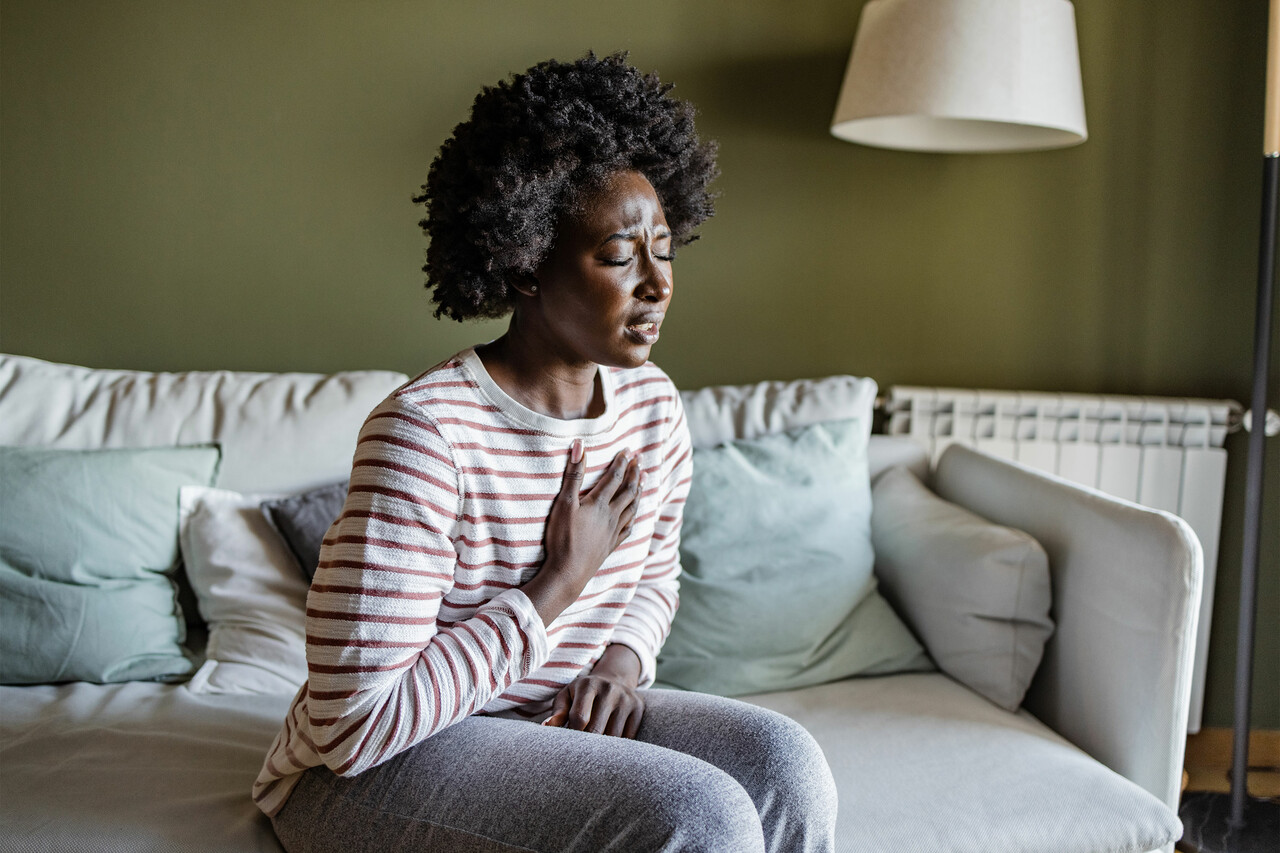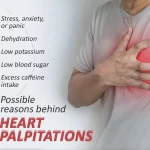Facts About Anxiety and Heat Palpitations
To understand anxiety and heart palpitations, heart palpitations triggered by anxiety create sensations where your heart races, flutters, pounds, or occasionally skips a beat. These palpitations often occur in response to stressful situations, causing your heartbeat to escalate.
Additionally, individuals with an anxiety disorder, characterized by excessive or prolonged worry, may experience palpitations as a symptom.
During such episodes, it’s common to feel your heart beating faster than usual, sometimes accompanied by sensations in your chest, neck, or throat. These palpitations are typically temporary and subside once the anxiety-inducing situation passes or is managed.
However, in cases of chronic anxiety disorders, palpitations can be more frequent and persistent, requiring ongoing attention and treatment to alleviate symptoms and improve quality of life.
What are Anxiety Heart Palpitations?
When you feel your heart pounding, fluttering, racing, or skipping a beat, these sensations are called heart palpitations. You might notice your heart beating strongly in your chest, neck, or throat.
Many people experience heart palpitations when they are anxious. Anxiety triggers the body’s “fight or flight” response, which is controlled by the autonomic nervous system (ANS). When you’re nervous or stressed, the ANS increases your heart rate.
Are Heart Palpitations from Anxiety Dangerous?
While heart palpitations can be scary, they are usually not dangerous and tend to go away once the anxiety-causing situation is over.
However, in rare cases, heart palpitations can indicate a serious health issue like an arrhythmia (abnormal heart rhythm).
These kinds of palpitations might feel like they cause anxiety instead of being caused by it. If you have palpitations along with chest pain, difficulty breathing, dizziness, or confusion, seek medical attention immediately.
How Common Are Heart Palpitations Caused by Anxiety?
Heart palpitations due to anxiety are very common and are not usually related to heart problems. Most people experience anxiety in stressful situations, like job interviews, public speaking, or flying. Typically, these anxious moments and the associated heart palpitations pass quickly.
If you frequently feel anxious or your anxiety lasts a long time, talk to your healthcare provider. You might have an anxiety disorder or a panic disorder. Medication, therapy, or a combination of both can help manage your symptoms.
Symptoms and Causes
What are the Symptoms of Heart Palpitations and Anxiety?
- Fluttering: You might feel a flapping or fluttering sensation in your chest, as if your heart is flipping.
- Irregular Heartbeat: It can feel like your heart skips a beat or beats out of rhythm. You may notice your heart speeding up, slowing down, or pausing for a moment.
- Pounding: Your heart may beat very forcefully or strongly. Some people even feel their heart beating in their ears.
These sensations can be unsettling, but understanding that they are often harmless and related to anxiety can help reduce worry. If these symptoms persist or cause significant distress, seeking medical advice is a good idea.
SEE ALSO: How To Stop Overthinking
Why Does Anxiety Cause Heart Palpitations?
Anxiety triggers the body’s autonomic nervous system (ANS), which controls vital functions such as:
- Breathing: The ANS manages your breathing rate and depth.
- Digestion: It regulates the movement of food through your digestive system.
- Heart Rate: The ANS controls how fast or slow your heart beats.
When you’re anxious, your ANS activates the fight or flight response, preparing your body to deal with a perceived threat. This response can cause heart palpitations, along with other symptoms such as:
- Fatigue: You might feel extremely tired as your body expends energy dealing with anxiety.
- Gastrointestinal Issues: Anxiety can upset your stomach, leading to symptoms like gas or diarrhea.
- Rapid Breathing: You may breathe faster or feel short of breath as your body tries to take in more oxygen.
- Sweating: Your body might produce more sweat as a way to cool down during stress.
- Tense Muscles: Your muscles may tighten up, making you feel stiff or sore.
- Trembling: You could experience shaking or trembling as your body reacts to anxiety.
How Long Can Heart Palpitations Last from Anxiety?
Heart palpitations caused by anxiety typically last only a few minutes. They often come on suddenly and disappear just as quickly.
If you experience frequent heart palpitations due to anxiety, it might indicate an anxiety disorder. This means your anxiety is intense enough to interfere with daily activities like working, studying, or socializing.
Anxiety disorders are very common in the U.S., affecting nearly 1 in 5 people at some point in their lives.
Can You Mistake Other Types of Heart Palpitations for Anxiety Heart Palpitations?
Not all heart palpitations are caused by anxiety. If your palpitations last longer than a few minutes or happen often, they might be due to other health issues, such as:
- Heart Rhythm Problems (Arrhythmias): Conditions like atrial fibrillation (Afib) can cause irregular heartbeats.
- Myocarditis: Inflammation of the heart muscles, often due to a viral infection, can lead to palpitations.
- Thyroid Problems: Disorders like hyperthyroidism can affect your heart rate.
- Structural Heart Issues: Problems with the heart’s structure, such as valve disease, can also cause palpitations.
If you suspect your palpitations are not related to anxiety, it’s important to consult a healthcare provider for a proper diagnosis.
Diagnosis and Tests
How Do Healthcare Providers Diagnose Heart Palpitations Caused by Anxiety?
Healthcare providers need to rule out other conditions before diagnosing heart palpitations as anxiety-related. Here’s what they typically do:
- Heart Examination: They listen to your heart to detect murmurs or any unusual sounds.
- Questions About Your Life:
- Medications: They ask about all the medications you take, including herbal supplements.
- Diet: They check what you eat and drink regularly.
- Lifestyle: They inquire about your alcohol and caffeine intake, as these can trigger palpitations.
- Medical History and Symptoms: They review your medical history and any symptoms you have.
To ensure there are no underlying issues, your provider might recommend:
- Blood Tests: A complete blood count (CBC) can identify anemia or low potassium. They’ll also test for thyroid problems or other conditions that might cause palpitations.
Will My Healthcare Provider Be Able to Rule Out Other Causes of Heart Palpitations?
Yes, they aim to ensure that anxiety-related palpitations are not dangerous. They may suggest additional tests, such as:
- Chest X-ray: To check the condition of your heart and lungs.
- Echocardiogram: To assess how well your heart is functioning.
- Electrocardiogram (EKG or ECG): To monitor your heart rate.
- Exercise Stress Test: To see how your heart handles physical activity.
- Holter Monitoring: To record your heart’s activity over 24 to 48 hours.
If the Holter monitor doesn’t show any unusual heart rhythms, you might be given an event recorder. You can wear this for weeks and press a button to record any heart sensations you feel.
Management and Treatment
How Do Providers Treat Heart Palpitations and Anxiety?
If your heart palpitations are diagnosed as anxiety-related, your healthcare provider might recommend:
- Complementary Health Treatments: Techniques like biofeedback and massage therapy can help you relax.
- Medications:
- Anti-Anxiety Medications and Antidepressants: These can help manage anxiety.
- Short-term Medications for Specific Situations: Beta blockers like propranolol and benzodiazepines like alprazolam (Xanax®) or diazepam (Valium®) may be used for anxiety during specific events, like flying or public speaking. Benzodiazepines should only be used occasionally as they can be habit-forming.
- Psychotherapy:
- Cognitive Behavioral Therapy (CBT): Helps you recognize and change anxious thought patterns.
- Exposure-Response Prevention: Teaches you to respond positively to fears, which helps reduce anxiety.
How Can I Manage Heart Palpitations and Anxiety?
You can try various self-management techniques to lessen the impact of heart palpitations caused by anxiety:
- Coping with Stress: Find healthy ways to manage and reduce stress in your life.
- Diaphragmatic Breathing: Practice deep breathing exercises to calm your body.
- Regular Exercise: Engage in physical activity to help regulate your heart and reduce anxiety.
- Getting Enough Sleep: Ensure you get sufficient rest to keep your body and mind healthy.
- Meditation: Practice mindfulness or meditation to promote relaxation.
- Pursed-Lip Breathing: Use this technique to slow your breathing and calm yourself.
- Mindful Movement: Activities like tai chi or yoga can help you stay centered and reduce anxiety.
By combining medical advice with these self-help techniques, you can better manage anxiety and reduce the occurrence of heart palpitations.
YOU MAY LIKE: Reasons for Heart Palpitation
Prevention

Can I Stop Heart Palpitations and Anxiety?
While you might not completely prevent heart palpitations caused by anxiety, you can take steps to reduce their frequency and intensity. Start by identifying your triggers, such as public speaking, flying, or stressful phone calls.
Once identified, you can develop a plan to manage anxiety in these situations. Techniques like relaxation exercises, medications, and therapy can all play a role in preventing future episodes.
SEE ALSO: Signs You Might Need a Cardiologist
Outlook / Prognosis
What is the Outlook for People with Heart Palpitations and Anxiety?
For many individuals, heart palpitations caused by occasional anxiety can be managed effectively using relaxation strategies. These techniques can help slow down your heart rate during anxious moments. If your palpitations stem from a chronic anxiety disorder, there’s still hope.
Proper treatment, including therapy and possibly medication, can significantly alleviate symptoms. A supportive healthcare team can assist you in developing a personalized coping strategy.
If you suspect another health condition is contributing to your palpitations—whether alongside anxiety or not—consult your healthcare provider promptly. Treating the underlying cause is essential for symptom relief. Therapies aimed at reducing anxiety can also be beneficial in such cases.
Living With
When Should I See My Healthcare Provider About Heart Palpitations and Anxiety?
Always inform your healthcare provider about any new symptoms you experience. Seek immediate medical attention if you have heart palpitations accompanied by:
- Chest pain or discomfort.
- Difficulty breathing or other respiratory issues.
- Dizziness or confusion.
- Loss of consciousness or fainting.
- Severe swelling in your limbs, especially your legs, ankles, and feet.
- Unusual or sudden fatigue.
These symptoms could indicate a more serious issue that requires prompt evaluation and treatment.
Remember, while anxiety-related heart palpitations are common and often benign, it’s crucial to address any concerns with your healthcare provider to ensure appropriate management and to rule out other potential causes.
Taking proactive steps to manage stress and anxiety can significantly improve your quality of life and reduce the impact of palpitations.
Benefits of Eating Strawberries
Benefits of Eating Pomegranate

A graduate of Computer Science and Information Management Technology. Diploma – Caregiving, Certificates – Dementia and Diabetes Awareness and Management. A researcher, blogger, songwriter, singer and acoustic guitarist. Born in an environment where natural talents such as healing are imparted at our natural birth. This natural talents of healing is the result of our genetic inheritance and the training from family environment.























